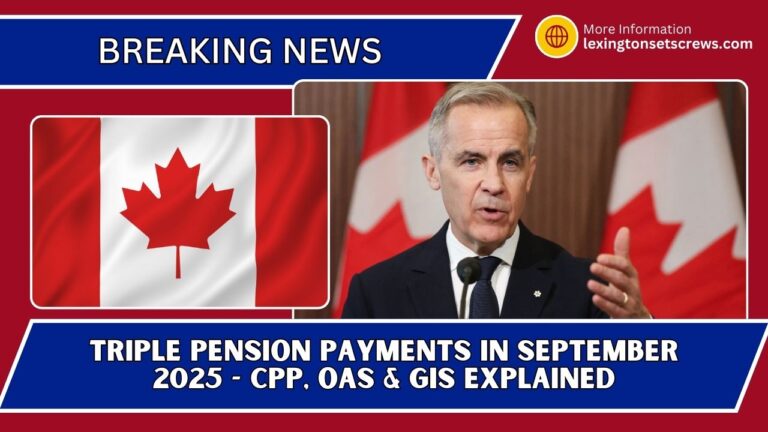Canada Retirement Age May Rise – Will CPP And OAS Benefits Change In 2025?

In 2025, a big discussion is happening in Canada about retirement age and pensions. With more seniors, higher costs of living, and longer lifespans, the question is simple: Can Canada’s pension system continue to support everyone at age 65?
Currently, Canadians can claim Canada Pension Plan (CPP) and Old Age Security (OAS) at 65, but new proposals suggest the age could increase. This change may affect millions of future retirees.
Why Is Canada Debating Retirement Age?
Several challenges are putting pressure on CPP and OAS:
- Aging population – By 2030, more than 20% of Canadians will be 65 or older.
- Longer lifespans – Better healthcare means people live longer, so pensions must last longer.
- Rising inflation – The cost of living is higher, making it harder for seniors to retire at 65.
- Pension funding issues – Experts are warning about the financial strain on the pension system.
All these factors make the government consider changing retirement rules.
Policy Proposals Being Discussed
Lawmakers are studying several options in 2025. Here are the main ideas:
- Raising retirement age: Gradually increasing it from 65 to 67 by 2030.
- Flexible pension access: Allowing people to take partial CPP at 60 while still working.
- Higher contributions: Especially from high-income earners to strengthen pension funding.
- Deferral rewards: Larger bonuses for seniors who delay collecting pensions beyond 65.
- New tax credits: Offering benefits to seniors who choose to keep working past 65.
These ideas try to balance fair support for retirees and the financial health of the pension system.
Impact On Different Age Groups
The effect of reforms depends on your stage of life:
- Ages 60–64: Early retirement is possible, but payments will be lower. Flexible “work and retire” rules may apply.
- Current retirees: No big changes right now, though future adjustments to indexing or benefits may happen.
- Younger workers: Most likely to face a later retirement age and higher contributions.
For workers in physically demanding jobs, delaying retirement could be especially hard. Many argue reforms should not unfairly burden lower-income workers.
Proposed Changes
| Policy Proposal | Current Status | Proposed Change | Impacted Group |
|---|---|---|---|
| Retirement Age | 65 | Increase to 67 by 2030 | Workers under 60 |
| Partial Pension Withdrawal | From 60 | More flexibility with work | Early retirees |
| CPP Contributions (High Earners) | Standard rate | Higher rate | High-income earners |
| Pension Deferral Bonuses | Optional | Larger rewards | Seniors retiring late |
| Tax Credits for Working Seniors | Limited | Expanded | Seniors 65+ |
Political And Public Reactions
Not everyone agrees on raising the retirement age:
- Supporters say it is necessary to keep pensions sustainable for the future.
- Critics argue it hurts lower-income and blue-collar workers, who may not live long enough to enjoy delayed pensions.
- Senior groups like CARP are urging reforms that protect vulnerable retirees.
- Public opinion is mixed – professionals in cities often support working longer, while rural and physical workers strongly oppose it.
What’s Next?
As of September 2025, no official law has been passed. But the pressure to act is strong. The government may soon decide how to update CPP and OAS rules.
For those nearing retirement, it is wise to review financial plans and explore private savings. For younger Canadians, the debate is a reminder to prepare with workplace pensions and personal savings.
Canada is facing a turning point in its retirement policies. With more seniors, longer lifespans, and rising living costs, the future of CPP and OAS is under review.
While no official decision has been made yet, any changes will shape the financial security of millions of Canadians for decades. Planning ahead is more important than ever.
FAQs
What is the current retirement age in Canada?
At present, Canadians can claim full CPP and OAS at age 65.
Is the retirement age definitely increasing?
Not yet. Proposals suggest raising it to 67 by 2030, but no law has been passed.
Will current retirees be affected?
Current retirees will not see major changes now, but future benefit adjustments are possible.






